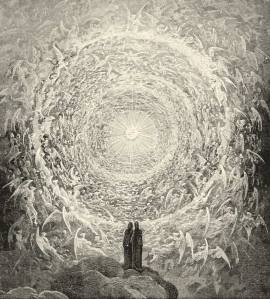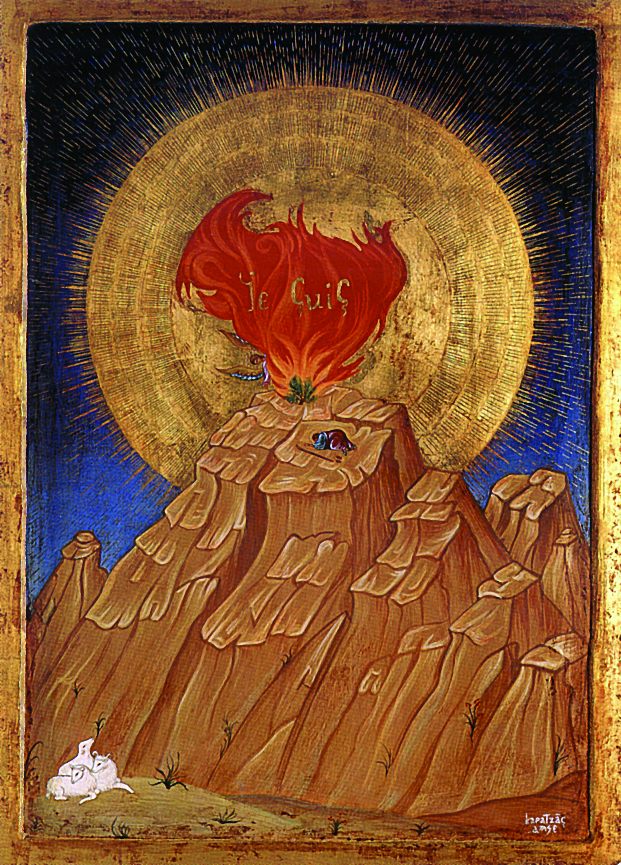This series examines what we don’t believe — and why — in order to help us understand what we do believe, and why we believe it.
The church does not believe that God is an angry bastard who tortured his own Son. I found myself in a bit of a bind with this column, because today is the Feast of the Transfiguration, an incident that many people find  unbelievable in and of itself. The story appears in all three synoptic Gospels (Mark, Matthew, and Luke), and it tells us that, shortly before his death, Jesus went up a mountain with Peter, James, and John, and all of a sudden “he was transfigured before them” and his clothes shone with an unearthly light and Moses and Elijah appeared and began to speak with him. Most sermons I’ve heard (or preached) about this passage focus on what comes next: Peter, frightened out of his wits, offers to build each of them a house. I think we tend to focus on that part of it because we have no idea what to do with the first part; it is not something that seems to have much relevance to our everyday lives, in which people are not often lit up by heavenly strobe lights, and ancient prophets do not drop in at the shopping mall. I think this very quality of inexplicability is our essential learning.
unbelievable in and of itself. The story appears in all three synoptic Gospels (Mark, Matthew, and Luke), and it tells us that, shortly before his death, Jesus went up a mountain with Peter, James, and John, and all of a sudden “he was transfigured before them” and his clothes shone with an unearthly light and Moses and Elijah appeared and began to speak with him. Most sermons I’ve heard (or preached) about this passage focus on what comes next: Peter, frightened out of his wits, offers to build each of them a house. I think we tend to focus on that part of it because we have no idea what to do with the first part; it is not something that seems to have much relevance to our everyday lives, in which people are not often lit up by heavenly strobe lights, and ancient prophets do not drop in at the shopping mall. I think this very quality of inexplicability is our essential learning.  There is no earthly phenomenon that even remotely approximates what the disciples saw on that mountain. And Peter’s reaction — helpless, befuddled, confused — mirrors our own. We attempt to explain the miracle, domesticate it (as I just did above), contain the miracle in a human construct, when the reality is that it simply transcends our understanding. As does Jesus. As does God. From the beginning of humanity’s relationship with God, our greatest temptation has been to make God over into our own image. I don’t mean painting God as a human being, which we thought about together last week. I mean the much more insidious tendency to make God fit into our mental categories: to see God in terms of human motives, human capacities, human morality. Particularly if we love God, we want God to be like us, just as we want our spouses, partners, loved ones to share our values, enjoy our favorite activities, and become angry by what shakes us to the bone. But when we try to do this, we end up with a God who looks like a monster. Over and over, people ask me some version of this question: “How can we really say that God is good?” The people who ask this are always compassionate people who are scandalized by the suffering in the world — by hunger, warfare, disease, by mental illness, cancer, hatred — and who think that if God is really good (as we usually think of goodness), God would not permit this stuff to happen. True confession: This issue bothers me, too. A lot. I’ve yelled at God about this one myself. My senior year in seminary, I volunteered to take one of the shifts in our seminary’s all-night vigil on Maundy Thursday. If you’ve never
There is no earthly phenomenon that even remotely approximates what the disciples saw on that mountain. And Peter’s reaction — helpless, befuddled, confused — mirrors our own. We attempt to explain the miracle, domesticate it (as I just did above), contain the miracle in a human construct, when the reality is that it simply transcends our understanding. As does Jesus. As does God. From the beginning of humanity’s relationship with God, our greatest temptation has been to make God over into our own image. I don’t mean painting God as a human being, which we thought about together last week. I mean the much more insidious tendency to make God fit into our mental categories: to see God in terms of human motives, human capacities, human morality. Particularly if we love God, we want God to be like us, just as we want our spouses, partners, loved ones to share our values, enjoy our favorite activities, and become angry by what shakes us to the bone. But when we try to do this, we end up with a God who looks like a monster. Over and over, people ask me some version of this question: “How can we really say that God is good?” The people who ask this are always compassionate people who are scandalized by the suffering in the world — by hunger, warfare, disease, by mental illness, cancer, hatred — and who think that if God is really good (as we usually think of goodness), God would not permit this stuff to happen. True confession: This issue bothers me, too. A lot. I’ve yelled at God about this one myself. My senior year in seminary, I volunteered to take one of the shifts in our seminary’s all-night vigil on Maundy Thursday. If you’ve never  participated in one of these, the idea is profound: on the night that the disciples fled and left Jesus alone with his persecutors, we step into their empty shoes and accompany Jesus with our love and our prayers, so that he will not be alone in his time of degradation. That night, I did not exactly fill the mandate. It was the time of the Second Intifada, and I, as a Christian of Jewish heritage, was deeply anguished that my spiritual brothers and sisters were killing each other. I spent two hours in that chapel condemning God for allowing this to happen. I listed various forms of harm in detail. I wept, threw at Jesus the images I remembered from the newspapers, became one with the voices of the Roman soldiers who had taunted him that night, so long ago. At last, exhausted, I ground to a halt. Then I heard a voice in my heart: Do you not think it does the same thing to me, when they kill one another in my name? That was all, but it was enough to remind me that I was standing on holy ground, that the ways of God are different than my ways, that God’s understanding is of a different order than my own, that if I had ten thousand years to live and to study the works of God, I would never plumb more than the barest edge of Truth. There are more invisible creatures in a single drop of water than I could count in a lifetime. There are more hidden currents in my own
participated in one of these, the idea is profound: on the night that the disciples fled and left Jesus alone with his persecutors, we step into their empty shoes and accompany Jesus with our love and our prayers, so that he will not be alone in his time of degradation. That night, I did not exactly fill the mandate. It was the time of the Second Intifada, and I, as a Christian of Jewish heritage, was deeply anguished that my spiritual brothers and sisters were killing each other. I spent two hours in that chapel condemning God for allowing this to happen. I listed various forms of harm in detail. I wept, threw at Jesus the images I remembered from the newspapers, became one with the voices of the Roman soldiers who had taunted him that night, so long ago. At last, exhausted, I ground to a halt. Then I heard a voice in my heart: Do you not think it does the same thing to me, when they kill one another in my name? That was all, but it was enough to remind me that I was standing on holy ground, that the ways of God are different than my ways, that God’s understanding is of a different order than my own, that if I had ten thousand years to live and to study the works of God, I would never plumb more than the barest edge of Truth. There are more invisible creatures in a single drop of water than I could count in a lifetime. There are more hidden currents in my own  heart than I will ever understand. When I approach God, I walk into the terrain of Mystery. Like Moses, I need to kneel and take off my shoes and walk vulnerable onto Holy Ground. I need to accept my creatureliness: that I am a speck of dust, but a speck made in God’s image, a speck God has chosen to love. God is not nice, according to my standards. God is not safe or tame or predictable. But God is good: giver of all life, source of all being, endless plunge of love and mercy and grace held out to even the least and most despised thing in creation. And if I do not understand the ways of God, that is because I am not God. I am only me. The response of faith is trust. That is all.
heart than I will ever understand. When I approach God, I walk into the terrain of Mystery. Like Moses, I need to kneel and take off my shoes and walk vulnerable onto Holy Ground. I need to accept my creatureliness: that I am a speck of dust, but a speck made in God’s image, a speck God has chosen to love. God is not nice, according to my standards. God is not safe or tame or predictable. But God is good: giver of all life, source of all being, endless plunge of love and mercy and grace held out to even the least and most despised thing in creation. And if I do not understand the ways of God, that is because I am not God. I am only me. The response of faith is trust. That is all.  ______ (NB: Later in this series, we will look at what theologians have said about the issue of God and evil. For today, I am sticking with the wisdom of prayer.)
______ (NB: Later in this series, we will look at what theologians have said about the issue of God and evil. For today, I am sticking with the wisdom of prayer.)

Deborah, Thank you for doing this series. When we think about what God is NOT like, we dispel some wrong ideas, and get a little bit closer to the truth. I look forward to your next installment. The only bad thing is that I might have to wait a whole week for it! kristie